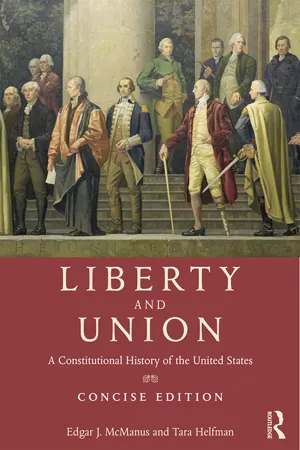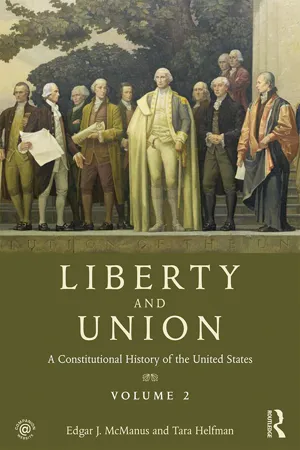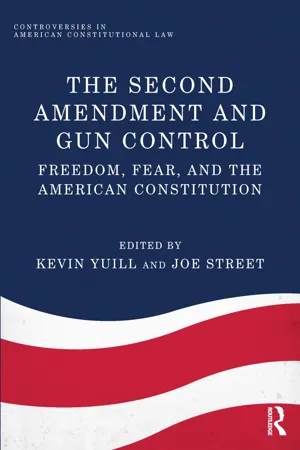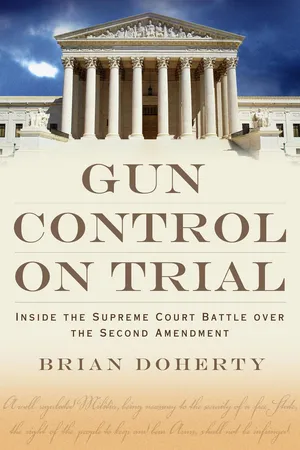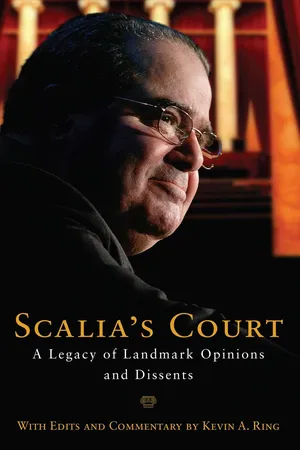Politics & International Relations
District of Columbia v. Heller
District of Columbia v. Heller was a landmark Supreme Court case in 2008 that affirmed an individual's right to possess firearms for self-defense within the home. The case struck down a Washington, D.C. law that banned the possession of handguns and required firearms in the home to be kept nonfunctional. The decision clarified the Second Amendment's protection of an individual's right to bear arms.
Written by Perlego with AI-assistance
Related key terms
5 Key excerpts on "District of Columbia v. Heller"
- eBook - ePub
Liberty and Union
A Constitutional History of the United States, concise edition
- Edgar J. McManus, Tara Helfman(Authors)
- 2014(Publication Date)
- Routledge(Publisher)
Scalia conceded that Second Amendment rights, like other constitutional rights, are not absolute and unconditional. The amendment grants no right to keep and carry any weapon anywhere in any manner for any purpose whatsoever. Reasonable regulation of the right is permissible. Scalia noted that concealed weapons regulations are constitutional, as are prohibitions against the possession of firearms by felons and the mentally ill, as well as laws against the carrying of firearms in particular places such as schools, airplanes, and public buildings. But all such measures must be narrowly tailored to further a compelling public interest in ways that do not destroy the constitutional right. The District of Columbia law failed even to recognize the existence of the right. The handgun ban and trigger-lock requirement, with no exceptions for self-defense, did not reasonably regulate Second Amendment rights but obliterated them completely. Scalia ordered the District of Columbia to register Heller’s handgun and issue him a license to use it in his home.Although Heller certainly qualifies as a landmark decision, its immediate impact on gun control affected regulation only at the federal level. Because the Second Amendment had not yet been incorporated into the Fourteenth, the states still had a free hand to regulate gun ownership. But that was bound to change. Because Heller had elevated gun ownership to the status of a constitutional right that the federal government might not abridge, it logically followed that the states might not abridge the right either. The National Rifle Association and the gun lobby could be counted on to press the issue vigorously. The political climate for promoting Second Amendment rights had never been better. President Barack Obama and Senator John McCain, his Republican rival in the 2008 election, both endorsed the Heller decision. For many observers, it was no longer a question of whether but rather when the Supreme Court would extend the guarantees of the Second Amendment to the states.Proponents of Second Amendment rights had not long to wait. In McDonald v. Chicago (2010), just two years after Heller , the Court struck down ordinances banning handguns in Chicago and its suburb of Oak Park on the ground that the right to keep and bear arms is fully applicable to the states through the Fourteenth Amendment. Although the ordinances had been challenged under both the Privileges or Immunities and Due Process Clauses of the amendment, the plurality opinion by Justice Samuel Alito was based squarely on the latter. To have upheld the Privileges or Immunities challenge would have overturned a mountain of case law based on the narrow interpretation of the clause in the Slaughter-House Cases (1873). This was precisely the course urged by Justice Thomas in his concurring opinion, but the plurality justices thought otherwise. To do so would have resurrected a host of issues best left undisturbed. Besides, incorporating the Second Amendment into the Fourteenth via the Due Process Clause followed the settled jurisprudence of selective incorporation. Like Heller - eBook - ePub
Liberty and Union
A Constitutional History of the United States, volume 2
- Edgar J. McManus, Tara Helfman(Authors)
- 2013(Publication Date)
- Routledge(Publisher)
Scalia conceded that Second Amendment rights, like other constitutional rights, are not absolute and unconditional. The amendment grants no right to keep and carry any weapon anywhere in any manner for any purpose whatever. Reasonable regulation of the right is permissible. Scalia noted that concealed weapons regulations are constitutional, as are prohibitions against the possession of firearms by felons and the mentally ill, as well as laws against the carrying of firearms in particular places such as schools, airplanes, and public buildings. But all such measures must be narrowly tailored to further a compelling public interest in ways that do not destroy the constitutional right. The District of Columbia law failed even to recognize the existence of the right. The handgun ban and trigger-lock requirement, with no exceptions for self-defense, did not reasonably regulate Second Amendment rights but obliterated them completely. Scalia ordered the District of Columbia to register Heller’s handgun and issue him a license to use it in his home.While Heller certainly qualifies as a landmark decision, its immediate impact on gun control affected regulation only at the federal level. Since the Second Amendment had not yet been incorporated into the Fourteenth, the states still had a free hand to regulate gun ownership. But that was bound to change. Since Heller had elevated gun ownership to the status of a constitutional right that the federal government might not abridge, it logically followed that the states might not abridge the right either. The National Rifle Association and the gun lobby could be counted on to press the issue vigorously. The political climate for promoting Second Amendment rights had never been better. President Barack Obama and Senator John McCain, his Republican rival in the 2008 election, both endorsed the Heller decision. For many observers, it was no longer a question of whether but rather when the Supreme Court would extend the guarantees of the Second Amendment to the states.Proponents of Second Amendment rights had not long to wait. In McDonald v. Chicago (2010), just two years after Heller, the Court struck down ordinances banning handguns in Chicago and its suburb of Oak Park on the ground that the right to keep and bear arms is fully applicable to the states through the Fourteenth Amendment. Although the ordinances had been challenged under both the Privileges or Immunities and Due Process Clauses of the Amendment, the plurality opinion by Justice Samuel Alito was based squarely on the latter. To have upheld the Privileges or Immunities challenge would have overturned a mountain of case law based on the narrow interpretation of the clause in the Slaughter-House Cases (1873). This was precisely the course urged by Justice Thomas in his concurring opinion, but the plurality justices thought otherwise. To do so would have resurrected a host of issues best left undisturbed. Besides, incorporating the Second Amendment into the Fourteenth via the Due Process Clause followed the settled jurisprudence of selective incorporation. Like Heller, - eBook - ePub
The Second Amendment and Gun Control
Freedom, Fear, and the American Constitution
- Kevin Yuill, Joe Street(Authors)
- 2017(Publication Date)
- Routledge(Publisher)
To endure for all time or to change with the times? The Supreme Court and the Second AmendmentEmma LongIntroduction
In June 2008, the US Supreme Court handed down its decision in District of Columbia v. Heller , ruling for the first time that the Second Amendment to the US Constitution guaranteed an individual right to bear arms for the purposes of self-defence. Gun rights activists responded with joy that a majority of the Justices had endorsed a reading of the Amendment that they had advocated for nearly three decades. Gun control supporters expressed disappointment at the Court’s ruling, which struck down what were the strictest gun laws in the nation, but also argued that Heller offered support for their position too. In fact, both leading presidential candidates, John McCain and Barack Obama, publicly offered their support for Heller. 1 How could both sides in the seemingly Manichaean debate between greater gun rights and greater gun control claim support from the same ruling? Because, in reality, Heller offered something to both sides. While finding the Amendment protected an individual right to own firearms separate from militia participation, the Court also clearly stated that right was not unlimited, and it offered what one commentator called a “laundry list” of regulations on gun ownership and use that remained acceptable under the Second Amendment.2 Thus in answering one question (the scope of the right protected by the Amendment), the Court’s ruling in Heller offered up an array of others (exactly what regulations were permitted), guaranteeing continued debate about guns in American society that ensured the Second Amendment would remain relevant well into the twenty-first century.Heller also presented, in stark terms, a clash between two competing theories of constitutional interpretation: originalism versus living constitutionalism. Justice Antonin Scalia, who wrote for the five-Justice majority in Heller , described the ruling as the greatest “vindication of originalism.”3 Emerging initially as a means by which conservatives could criticise the liberal, individual rights rulings of the Warren Court, originalists argued that the meaning of the Constitution should be found by seeking the “intent” of those who created it. Objecting to what they saw as activist judges ignoring the words and meaning of the Constitution in favour of writing their own personal policy preferences into law, advocates offered originalism as a method of restraining the judiciary and “returning” the Constitution to the meaning intended by the Founding Fathers. Scholarly criticism of the methods of original intent led to the development of what has come to be known as “original public meaning, ” the version of originalism found in Heller - eBook - ePub
Gun Control on Trial
Inside the Supreme Court Battle Over the Second Amendment
- Brian Doherty(Author)
- 2008(Publication Date)
- Cato Institute(Publisher)
, that is, all of us as individuals. He decided that ‘‘bear arms’’ had more than just a military meaning in the idiom of the founding era. He noted the ‘‘sophisticated collective rights theory’’ posited by D.C., but blew it away by noting that it was the functional equivalent of the old collective rights theory— that the Second Amendment right applies to states, not individuals— in that it claims that the individual only has a Second Amendment right in connection with hismembership in a state militia. He also noted that the militia, in the Founding context, consisted of pretty much all able-bodied men, not a select group.Silberman stood up for his court’s right and ability to rethink the Second Amendment afresh, saying he felt no square precedent had been set in their circuit, nor by the Supreme Court. His decision interpretedMiller,the apparent dominant precedent, to say it hinged on the type of weapon the right affected, not the type of person. Silberman did not accept D.C.’s claim that any constitutional infringement was mitigated because the citymight not punish a long gun owner for loading and using his weapon in self-defense in defiance of the letter of the law—‘‘judicial leniency cannot make up for the unreasonable restriction of a right.’’The decision was well-reasoned, but it was only from one three-judge panel of the D.C. Circuit. D.C. officials requested a rehearing by the entire body of judges for the Circuit, known as a rehearing en banc. That request was denied in May 2007. The city then requested, and got, a stay on the order to stop enforcing its law while it decided whether it wished to take the case on to the next step: the Supreme Court of the United States.The decision in Hellerwas ultimately—and appropriately—based on legal and constitutional principles. But underlying the case— inspiring the plaintiffs to challenge the law and explaining why the decision alternately delighted and horrified many Americans—are powerful ideas and practices that underlie and also go beyond what the Second Amendment does or doesn’t mean. They have to do with self-defense and self-identity, and they aren’t so much about the Constitution or empirical reality as they are about a wider and deeper cultural war. - eBook - ePub
Scalia's Court
A Legacy of Landmark Opinions and Dissents
- Antonin Scalia, Kevin A. Ring(Authors)
- 2016(Publication Date)
- Regnery Publishing(Publisher)
District of Columbia v. Heller (2008)Well known for having some of the strictest gun control laws in the country, the District of Columbia government made it illegal for residents to own a handgun unless the chief of police issued the resident a one-year license. D.C. law also required that all firearms be kept unloaded and disassembled or bound by a trigger lock unless the firearms were located in a place of business or were being used for legal recreational activities.A D.C. special police officer named Dick Heller challenged the law. Heller, who was authorized to carry a handgun while on duty, had applied for a license to keep his gun at home, but the chief denied his request. Heller argued that the D.C. law restricting the licensing of handguns and requiring all licensed guns to be kept disassembled violated his individual right guaranteed by the Second Amendment to keep and bear arms.The district court dismissed Heller’s complaint, but the U.S. Court of Appeals for the D.C. Circuit reversed, holding that the Second Amendment protects the right to keep firearms in the home for the purpose of self-defense. The court ruled that the District’s requirement that firearms kept in the home be nonfunctional violated that right.In a lengthy, history-filled opinion, Justice Scalia argued that the Second Amendment, as understood by those who wrote and ratified it, guaranteed the right of self-defense for individuals. Scalia argued that the amendment has a prefatory clause and an operative clause, and that the prefatory clause’s reference to “militia” does not limit the substantive individual right protected by the operative clause. Scalia further noted that the term “militia” referred at the time to all able-bodied men who might be capable of being called into military service. “There seems to us no doubt, on the basis of both text and history, that the Second Amendment conferred an individual right to keep and bear arms,” Scalia wrote for the Court.
Learn about this page
Index pages curate the most relevant extracts from our library of academic textbooks. They’ve been created using an in-house natural language model (NLM), each adding context and meaning to key research topics.
